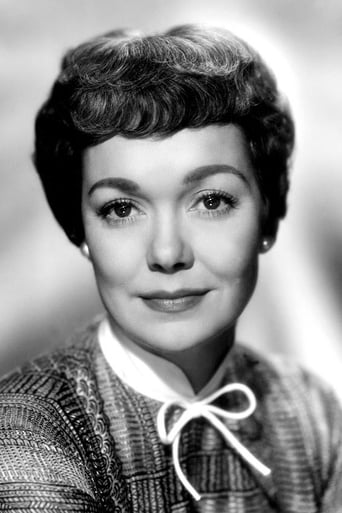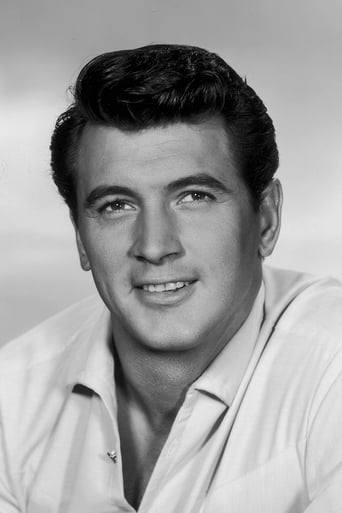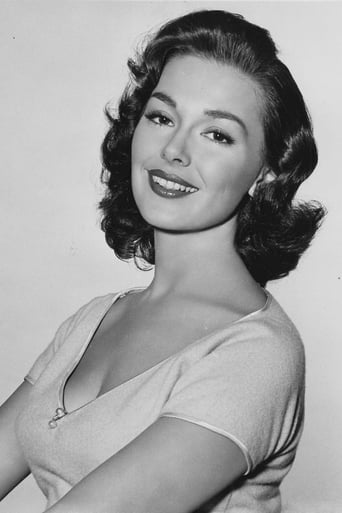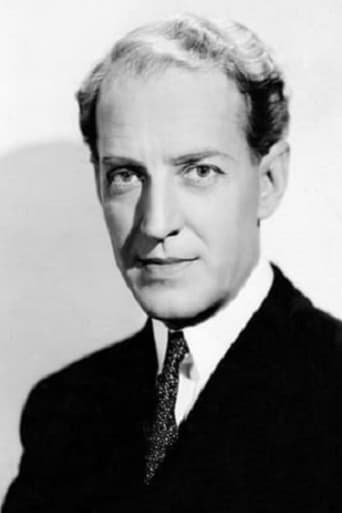UnowPriceless
hyped garbage
Aneesa Wardle
The story, direction, characters, and writing/dialogue is akin to taking a tranquilizer shot to the neck, but everything else was so well done.
Deanna
There are moments in this movie where the great movie it could've been peek out... They're fleeting, here, but they're worth savoring, and they happen often enough to make it worth your while.
Zandra
The movie turns out to be a little better than the average. Starting from a romantic formula often seen in the cinema, it ends in the most predictable (and somewhat bland) way.
Kirpianuscus
romanticism. Rock Hudson in one of his most interesting roles. drama and flavor of soap opera and fragments from atmosphere of a lost time. a film about true love against mistakes and errors from past and illusions. sure, not a great one but perfect for the admirers of the director and actors and as refuge in a pink place. but Magnificent Obsession has the gift to be more than a nice movie. but the occasion for discover the art of Jane Wyman and Rock Hudson to explore the details of roles in wise manner. to say a great story about the second chance. and, sure, about the force of love. so, in strange manner, a memorable film. fascinating, sure, first for the performances of the lead actors.
gavin6942
When churlish, spoiled rich man Bob Merrick foolishly wrecks his speed boat, the rescue team resuscitates him with equipment that is therefore unavailable to aid a local hero, Dr. Wayne Phillips, who dies as a result. Phillips had helped many people, and when Merrick learns Phillips' secret, to give selflessly and in secret, he tries it in a ham-handed way."Magnificent Obsession" was an early starring role for Hudson, and, according to Wyman, he was very nervous. Some of his scenes had to be re-shot thirty or forty times, but Wyman never said a word. Reportedly, years later at a party, Hudson ran into Wyman and said, "You were nice to me when you didn't have to be, and I want you to know that I thank you and love you for it." Douglas Sirk mastered the melodrama, and had the greatest color palettes. He also really knew how to utilize Rock Hudson. I don't know much about his personal life, but it strikes me as interesting that Sirk is now championed in some gay circles. Did Sirk know his star, Hudson, was gay? He certainly could have... though this would have been unusual in the 1950s.
Blake Peterson
Magnificent Obsession is exaggerated, nearly ludicrous soap, but it knows it. It cackles when Jane Wyman's smooth complexion is interrupted by the urge to break into a violently dramatic monologue. It quakes at the nearest sight of pastel interiors. It even seems to be aware that Magnificent Obsession is a title that instantly evokes a feeling of excessive melodrama. For a casual viewer, it may be too overwrought for its own good; but to only watch it for its woeful theatrics would be a mistake.In the 1950s, the name "Douglas Sirk" certainly did not mean much to critics or audiences. He was a director of flamboyant tearjerkers, easy to chow down on yet ultimately difficult to value. But now that Bette Davis is a bad bitch again, vintage Coca-Cola ads are viewed as art fixtures, and film noir has turned into a singular, sexy alternate to old Hollywood, you can say that time has been kind to Douglas Sirk. What was overtly flashy back then is intellectually artificial now; dramatic performances come second to the aggressively Technicolor style. When viewing a Sirk directed film, there is a feeling of parodical intuition from behind the camera. Unlike many filmmakers of the time, Sirk knew that he was building an elaborate women's picture, doing everything possible to accentuate the slightly unbelievable tone of the tragedies traded off between characters. Take one look at the hospital in which much of the film takes place — artificially painted flowers greet incoming customers, big, blocky signs indicate who's the concierge and who's the cashier, halls resemble leftover corridors from a highly budgeted romantic drama — and you can only soak in the rich, comical illustrations that illuminate the adversarial people who drench themselves in drama. The film opens with millionaire Bob Merrick (Rock Hudson) zooming around on a speedboat, a blonde by his side. Surrounded by scenic waters, he is everything a dangerous romantic lead should be: fearless, fun, and arresting. His charms come to an abrupt halt, however, when he crashes, nearly getting himself killed in the process. Though resuscitated by nearby onlookers, he is guilt-ridden when he finds out that his elaborate rescue inadvertently caused the death of the local Dr. Phillips, who suffered a heart attack but was not able to be revived in time.His wife, Helen (Wyman) is devastated, unwilling to accept donations from the town's population to keep his practice up-and-running. Bob wants to make right, but Helen is much too angry; things only take a turn for the worse when Helen accidentally steps in the path of an oncoming car when avoiding Bob's advances. The accident leaves her blind. And as if things couldn't get more contrived, not only do Helen and Bob eventually fall in love (he uses the guise of a student to cover his true identity), but he decides that the only way to truly make up for his past mistakes is to become a doctor and continue Dr. Phillips' work.Magnificent Obsession slowly but surely becomes an overdone mess in terms of story, but Sirk's ornate eye for visual detail makes up for the silliness of everything else. The plot serves as a metaphor for overcoming literal and metaphorical blindness, but that all seems like hogwash especially if you have two objects on your face called eyes. For most of the film, I felt as though turning the sound off wouldn't affect the overwhelming artistry and impact of the expressive images. Sirk makes everything (and I mean everything) absolutely beautiful; but there is not a single image that doesn't manifest a penetrating feeling of portraited longing. Among the pretty people, the pretty houses, the pretty trees, the pretty cars, there is a deep despair waiting to be renewed. The plot doesn't tell us so: the expressions of the actors, paired with Sirk's evocative style, sting an exquisite sting.Magnificent Obsession is only notable because Douglas Sirk directed it. Without him, it certainly wouldn't look as good. Without him, it certainly wouldn't feel so luminous, so somber. Rarely can the appearance of a movie completely make or break its successes, but in Magnificent Obsession, it is one of the most important components in its longevity and its vigor. Read more reviews at petersonreviews.com
bobsgrock
Douglas Sirk is often praised some 50 years after his career ended for being one of the most subversive and bittersweet of Hollywood directors of the 1950s. Born in Germany, he began his film career in the German cinema, only to flee when the Nazis took control. By the mid 1940s, he was a full-fledged Hollywood director assigned by studios to churn out as many films as possible. However, even after all these years, it is clear that like fellow immigrant directors Billy Wilder and Ernst Lubitsch, there was a dark undertone in all of Sirk's works that continues to amaze today.The first of Sirk's most well-known films was Magnificent Obsession, a glossy Technicolor melodrama that on the surface appears to be as soapy and exploitative as any daytime television drama. However, many critics and scholars in recent years have instructed us to look closer, to try and understand the hidden meanings and undertones of such a story. Clearly, it is obvious that Sirk used such a decor and platform as that was what he was given to work with. Melodramas were becoming quite popular in the 1950s, this itself being a reflection of the growing artifice and superficial decadence that would come to characterize postwar America. Sirk, being a European immigrant, would know and recognize this better than almost anyone. Therefore, he brilliantly used American settings, characterizations and story lines to subject to American audiences the very ideas and social graces he saw through. Just as expected, people fell for the bait and came in droves to witness what they though was simply a tearjerker exploring the relationship between a spoiled rich playboy and a well-meaning widow of a revered doctor.Though it may be impossible to truly grasp all of Sirk's secrets after just one viewing, it seems to me that one of the critiques most notable here is the motivation these characters possess. Another reviewer described this film as a quest for spirituality. Redemption and understanding may also be added to this list as nearly all of these characters attempt to find consolation and faith in things that reflect their own artificial emotion and feelings. Do any of these characters truly have a moral center that guides their everyday actions? Or are they simply living out of guilt, fear, jealousy and self-loathing? These are loaded questions to be sure, but the more I write the more I am convinced that Magnificent Obsession is a loaded film.






